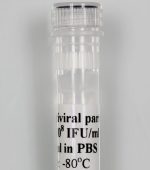Description
Lentivirus express peptide-major histocompatibility (pMH) specific T Cell Receptor (recognizing a Epstein-Barr virus) and CXCR3 receptor, containing no any antibiotic selection.
The TCR construct express the antibody specifically recognizes the a Epstein-Barr virus-specific pMH (Ref 1). The TCR α chain variable region with a transmembrane (TM) domain and β chain variable region with a transmembrane (TM) domain, are linked by F2A element, as “(TRαV3/Tm)-F2A-(TRβV5-6/Tm)”
By optimizing the homing of engineered T cells to tumor sites through the expression of CXCR3, it might be possible to improve the efficacy of TCR cell therapies in the context of cancer immunotherapy.
The “target-specific TCRαV and TCRβV sequences” are derived from the verified clones according to published literatures. It does not contain any antibiotic selection marker, trying to minimize the marker’s possible immunogenicity. see the Lentivector core structure scheme below.
// –EF1a Promoter-[TCRαV(TM)-F2A-TCRβV(TM)]-P2A-CXCR3— //
About pMH (peptide-major histocompatibility):
TCRs recognize short peptides bound to and presented by class I and II major histocompatibility complex (MHC) molecules on the cell surface. The binding of TCRs to their target pMHC ligands initializes the cell-mediated immune response. The discovery of TCR-pMHC pairs is a challenging task as identifying tumor-specific pMHC ligands. the identification of therapeutically relevant TCR-pMHC will lead to the activation of T cells against infectious diseases and tumors.
About CXCR3:
CXCR3 is a G protein-coupled receptor (GPCR) expressed on the surface of various immune cells, including T cells. The primary function of CXCR3 is to bind to specific chemokines, such as CXCL9, CXCL10, and CXCL11, which are often induced in response to inflammation. It plays a role in the recruitment of T cells to inflamed tissues, with enhanced antitumor immune responses.
see details in Product Manual.
Amount: 200 ul/vial at titer of 1×108 IFU/ml, concentrated lentivirus provided in PBS solution, premixed with 10x polybrene (60ug/ml), premade, ready to ship in dry-ice package.
CAT#: LVP1692

